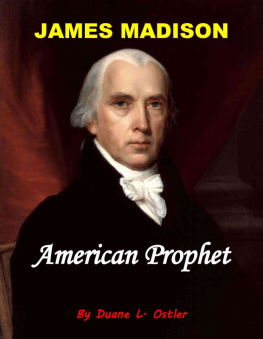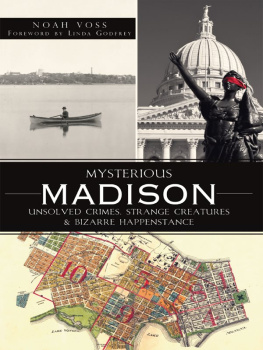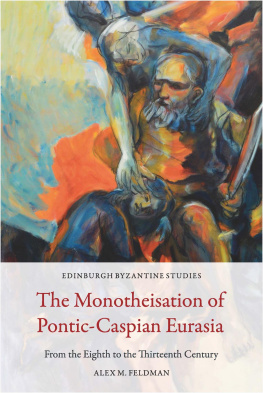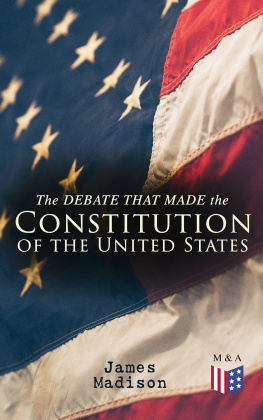Noah Feldman - The Three Lives of James Madison
Here you can read online Noah Feldman - The Three Lives of James Madison full text of the book (entire story) in english for free. Download pdf and epub, get meaning, cover and reviews about this ebook. year: 2017, publisher: Random House Publishing Group, genre: Politics. Description of the work, (preface) as well as reviews are available. Best literature library LitArk.com created for fans of good reading and offers a wide selection of genres:
Romance novel
Science fiction
Adventure
Detective
Science
History
Home and family
Prose
Art
Politics
Computer
Non-fiction
Religion
Business
Children
Humor
Choose a favorite category and find really read worthwhile books. Enjoy immersion in the world of imagination, feel the emotions of the characters or learn something new for yourself, make an fascinating discovery.

- Book:The Three Lives of James Madison
- Author:
- Publisher:Random House Publishing Group
- Genre:
- Year:2017
- Rating:3 / 5
- Favourites:Add to favourites
- Your mark:
- 60
- 1
- 2
- 3
- 4
- 5
The Three Lives of James Madison: summary, description and annotation
We offer to read an annotation, description, summary or preface (depends on what the author of the book "The Three Lives of James Madison" wrote himself). If you haven't found the necessary information about the book — write in the comments, we will try to find it.
The Three Lives of James Madison — read online for free the complete book (whole text) full work
Below is the text of the book, divided by pages. System saving the place of the last page read, allows you to conveniently read the book "The Three Lives of James Madison" online for free, without having to search again every time where you left off. Put a bookmark, and you can go to the page where you finished reading at any time.
Font size:
Interval:
Bookmark:
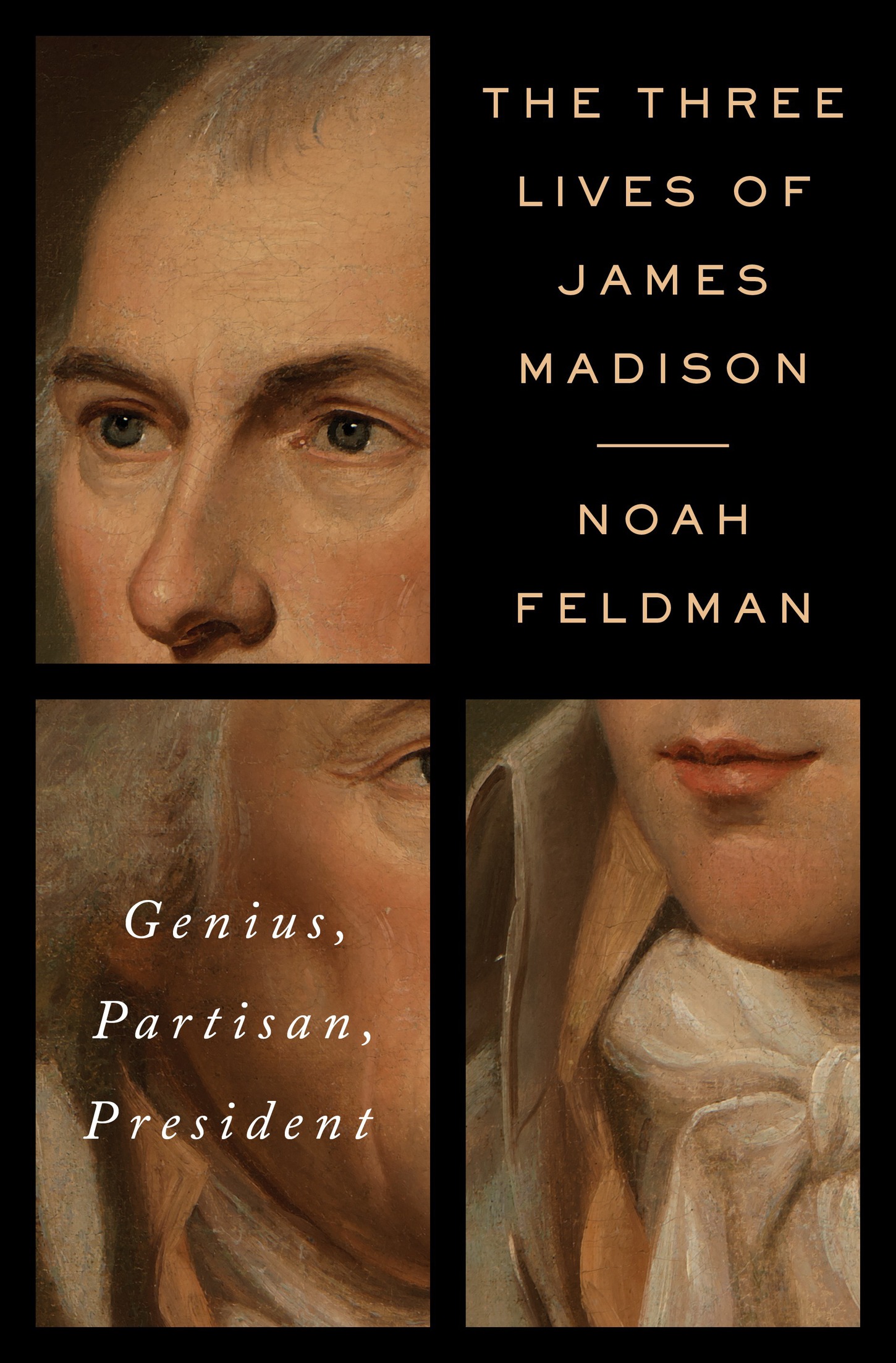
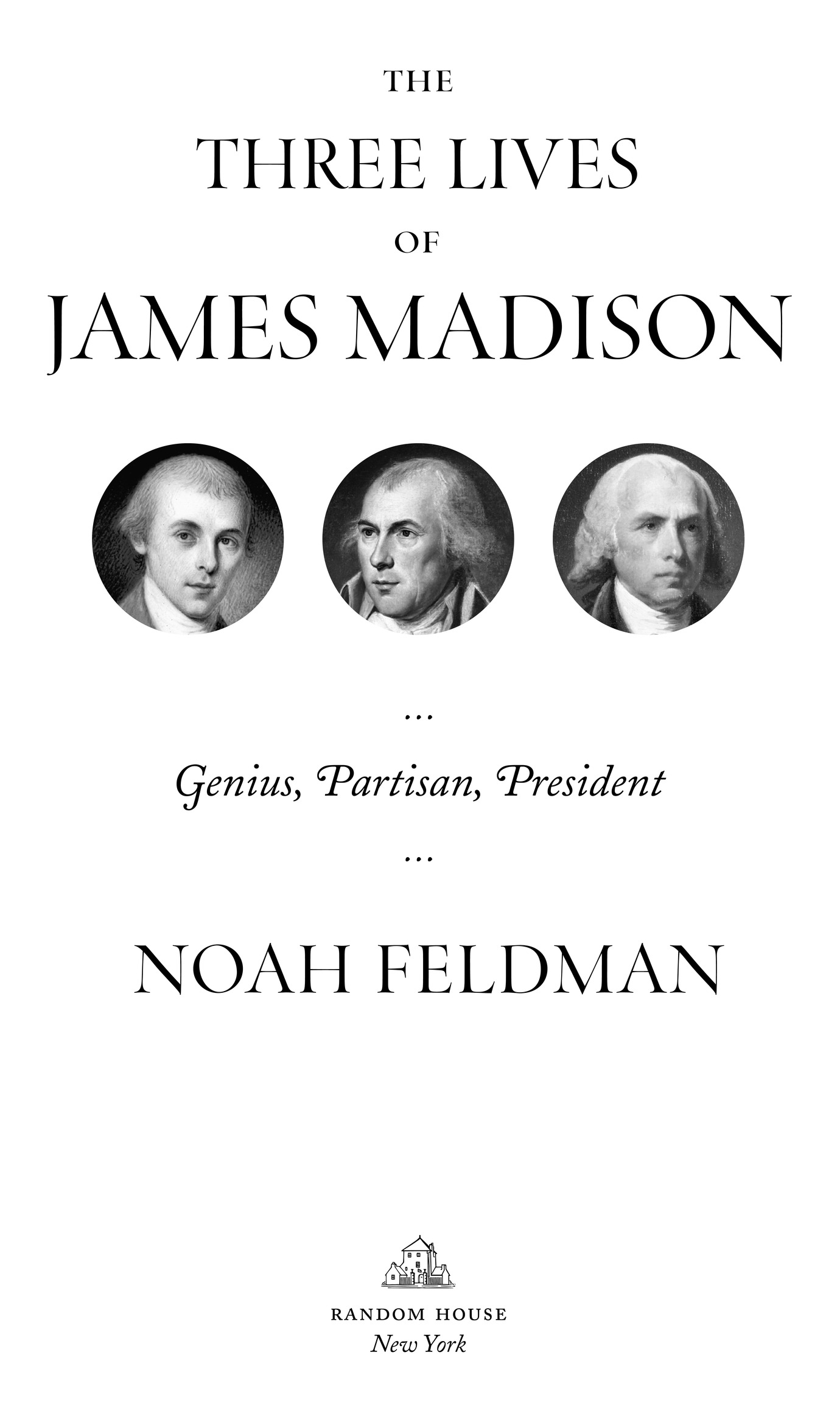
Copyright 2017 by Noah Feldman
All rights reserved.
Published in the United States by Random House, an imprint and division of Penguin Random House LLC, New York.
R ANDOM H OUSE and the H OUSE colophon are registered trademarks of Penguin Random House LLC.
LIBRARY OF CONGRESS CATALOGING-IN-PUBLICATION DATA
Names: Feldman, Noah, author.
Title: The three lives of James Madison : genius, partisan, president / Noah Feldman.
Description: New York : Random House, 2017. | Includes bibliographical references and index.
Identifiers: LCCN 2017000125 | ISBN 9780812992755 | ISBN 9780679643845 (ebook)
Subjects: LCSH: Madison, James, 17511836. | PresidentsUnited StatesBiography.
Classification: LCC E 342 . F 45 2017 | DDC 973.5/1092 [ B ]dc23
LC record available at https://lccn.loc.gov/2017000125
Ebook ISBN9780679643845
randomhousebooks.com
Book design by Simon M. Sullivan, adapted for ebook
Cover design: Pete Garceau
Cover illustration: adapted from a 1792 portrait of James Madison by Charles Willson Peale (Gilcrease Museum, Tulsa, Okla.)
v4.1
ep
I wish someone who was perfectly fitted for the task, would write a full and accurate biography of Madison. I fear that it can hardly be done now; for the men who best appreciated his excellences have nearly all passed away. What shadows we are!
Joseph Story to Ezekiel Bacon, April 30, 1842
I N ANY HISTORICAL ERA but his own, James Madison would not have been a successful politician, much less one of the greatest statesmen of the age. He hated public speaking and detested running for office. He loved reason, logic, and balance.
But Madison entered public life at a moment when revolution demanded that familiar institutions be reimagined and transformed. Time after time his close friends, the founders of the United States of America, struggled to find solutions as their hastily made arrangements failed. Each time, Madison retreated to the world of his ideas and books. There he thought, and worked, alone.
Within a few months, he would emerge with a solution that fit with the theory of a republic and was designed to work in practice. Deeply introverted and emotionally restrained, Madison directed his enormous inner energies into shaping ideas that could be expressed through precise, reasoned argument.
In this way, Madison devised the Constitution. He imagined its necessity. He designed its contours. He developed the theory that would justify it. He conceived the need for a national convention, brought his blueprint to Philadelphia, and after an intense struggle convinced the other delegates to adopt a version of it. If the Constitution was a new kind of governmental physics, Madison was its Newton or its Einstein.
Then Madison set out to convince the nation to ratify the constitution he had brought forth. With Alexander Hamilton, he wrote and published the Federalist papers, the most systematic arguments in its favor. He led the forces of ratification to victory over Patrick Henry in the pivotal Virginia convention. He proposed and drafted the Bill of Rights to head off a potentially disastrous second convention.
This extraordinary set of accomplishmentsover the course of only about five yearsearned Madison the nickname father of the Constitution and established his place in U.S. history and the global history of constitutions and democracy. But as it turned out, Madison had lived only the first of what would be three distinct, contrasting public lives.
Elected to Congress, where he began by setting the agenda and acting as George Washingtons point man, Madison discovered his Constitution was not as secure as he had believed. Hamilton, now secretary of the treasury, set out to shape the national economy just as Madison had framed the republics political system. To this end, Hamilton proposed a national debt and a national bank that together would permanently align the interests of the government with those of the financial markets. Madison denounced Hamiltons plans as a blatantly unconstitutional attempt to shift power from the people to the capitalists. Hamilton rejoined that Madison was wrong about the Constitutionand he had the support in Congress to back him up.
Having designed a Constitution intended to eliminate the need for political parties, Madison acknowledged the limits of his creation and adopted a tactic he thought he had rendered obsolete. With Jefferson, he formed the Republican Party to counter the Federalist Party. Once friends and allies, Madison and Hamilton became personal and political enemies. Their brutal struggle over the meaning of the Constitution and the future of the United States gave birth to American partisanship.
Agonizing partisan politics defined Madisons second public life. In the course of building alliances and writing the document that would become the platform for the first Republican Party, Madison became a different kind of politician. Chastened by the realities of deep division, he could no longer sustain the dream that his system would prevent faction through the genius of its own design. Now public opinion would have to be captured and deployed to protect the public interest. And that public opinion would, in turn, be used to target and destroy the enemies of the Constitution and of the republicnamely Hamiltons Federalists.
When the Republicans returned to power with Thomas Jeffersons election in 1800, Madisons third public life began. Previously he had always acted through collective bodies such as legislatures and conventions. Now for the first time he became a statesman, wielding executive power on an international scale. As secretary of state and then president, he undertook a sixteen-year odyssey to establish Americas place in a world defined by the long war between Great Britain and France.
Madisons goal was to make the United States, with its new form of government, into a new kind of independent global actor. Convinced that a constitutional republic must operate differently from Europes monarchies, Madison developed the idea that economic sanctions were the perfect republican lever of power. The goal was to force Britain and Napoleons France to allow American shipping to the European continentand to do so without an army or a navy that could potentially subvert the republic from within.
Alone, the economic sanctions did not work quickly enough. Slowly and painfully, Madison confronted the reality that the United States had to be willing to threaten force to make other states bend to its will. With his presidency on the line, Madison gambled on decisive action. Overcoming his republican aversion to military action, he asked Congress to declare the War of 1812.
Madison became the first wartime president, despite having designed the republic to avoid armed conflict. The limitations imposed by the Constitution made war fighting inefficient and invasion of other countries ineffectual. But when the British turned the tables and tried to invade the United States, the constitutional republic was strong enough to defend itself.
Madison emerged from the war as a hero. Unlike every subsequent wartime president, he avoided the temptation of using the circumstances of international conflict to curtail civil liberties. The republic survived. So did the Constitution that defined it.
Charting Madisons three public lives, this book follows Madisons character and his Constitution on the path from idealistic innocence to chastened, realist experience. Madison believed that creating a republican state free of faction was the greatest political problem the world had ever known. He also believed the U.S. Constitution would make this ideal an institutional reality.
Font size:
Interval:
Bookmark:
Similar books «The Three Lives of James Madison»
Look at similar books to The Three Lives of James Madison. We have selected literature similar in name and meaning in the hope of providing readers with more options to find new, interesting, not yet read works.
Discussion, reviews of the book The Three Lives of James Madison and just readers' own opinions. Leave your comments, write what you think about the work, its meaning or the main characters. Specify what exactly you liked and what you didn't like, and why you think so.


